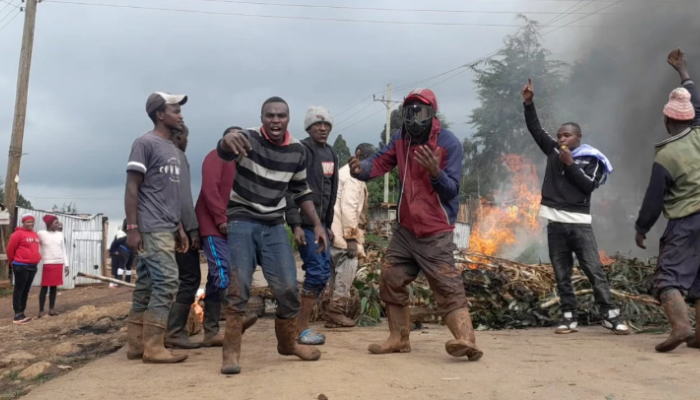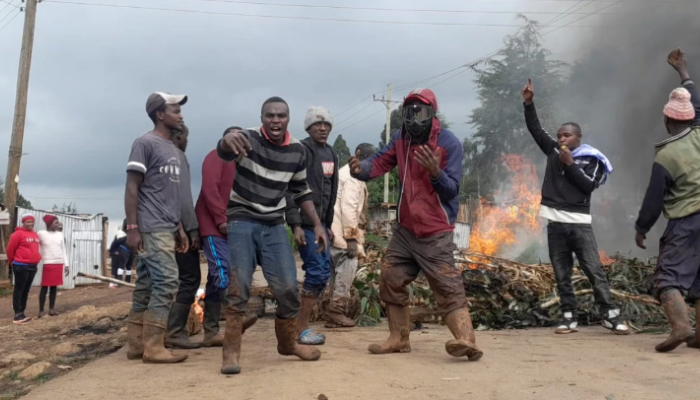
Outrage in Nanyuki Over Death of Julia Njoki Following Alleged Police Torture
Nanyuki, Kenya – Tensions are running high in Likii slum and surrounding areas of Nanyuki after the death of 24-year-old Julia Njoki, who reportedly succumbed to injuries sustained while in police custody. Her death has triggered public protests, outrage from human rights groups, and fresh scrutiny of law enforcement practices in Kenya, particularly in the wake of the recent Sabasaba demonstrations.
On Monday, protests erupted as residents attempted to march into Nanyuki town, demanding accountability and justice. However, their path was blocked by police, leading to heightened tensions and the erection of burning barricades along the main road into town. Demonstrators lit fires and chanted slogans calling for justice, particularly targeting the police officers allegedly involved in Njoki’s mistreatment. The unrest has paralyzed parts of the town, as protesters vow not to relent until those responsible are held accountable.
Julia Njoki’s ordeal began on July 7, during the Sabasaba protests—nationwide demonstrations held to express dissatisfaction with the government over cost of living, governance, and police brutality. According to her family, Njoki was not actively protesting but was on her way home when she was caught in a police roundup targeting demonstrators. She was arrested and taken to Nanyuki Police Station, where she spent the night in custody.
The next day, she was arraigned at the Nanyuki Law Courts and charged with malicious damage. Unable to raise a Ksh.50,000 bond, Njoki was remanded to the Nanyuki Women’s Prison. According to the Kenya Prisons Service (KPS), she was admitted to the facility on July 8 around 5:20pm along with four other women.
Later that evening, Njoki began complaining of severe headaches, dizziness, and stomach pains. KPS officials say she was transferred to Nanyuki Teaching and Referral Hospital around 7:00pm. However, her condition worsened rapidly. On July 9, she was referred to Cottage Hospital for a CT scan, and later admitted to the ICU where she underwent emergency surgery the following morning. She died three days later on July 12.
The family, however, believes her symptoms were a result of physical abuse while in police custody. A preliminary medical report accessed by the family indicates Njoki suffered blunt force trauma to the head—injuries consistent with a severe beating. Her father, speaking to local media, stated that they were shocked to find her in critical condition and barely conscious by the time they were informed of her hospitalization.
As of now, the official cause of death remains unconfirmed. A postmortem examination is scheduled for next Tuesday to establish whether the injuries were inflicted before or after her transfer to prison custody.
Njoki’s death has intensified public anger, particularly because it follows another high-profile custodial death—that of teacher Albert Ojwang’, who reportedly died from torture while in police detention. Like Njoki, Ojwang’ was taken to a hospital only after his condition had deteriorated. He was pronounced dead on arrival, and his case too is being investigated amid claims of systemic abuse by law enforcement.
Human rights organizations have called for immediate and independent investigations into both deaths. “What we are witnessing is not just tragic—it is systemic. Julia Njoki’s case is a glaring example of how police brutality and poor oversight continue to claim lives with impunity,” said a statement released by a coalition of civil society groups.
Meanwhile, political leaders have begun to weigh in. Local legislators have condemned the incident and are calling for an overhaul of the oversight mechanisms within the police and prison systems. “We cannot have young Kenyans dying in custody under mysterious circumstances. It is unacceptable, and it must stop,” said a Laikipia County official during a press briefing.
Calls are also growing for Interior Cabinet Secretary Kithure Kindiki and Police Inspector General Japhet Koome to intervene and ensure justice is served. Public trust in law enforcement is eroding, and unless firm action is taken, observers warn that the protests could escalate further.
Njoki’s family remains devastated and is demanding full transparency. “We just want to know the truth. What happened to our daughter? Why did it take so long for us to be informed she was in hospital?” her father asked, speaking outside their home.
As the country awaits the results of the postmortem, Nanyuki remains on edge. The image of Julia Njoki—a young woman caught in a protest sweep and allegedly brutalized to death—has become a stark reminder of the consequences of unchecked power within Kenya’s justice system.
The coming days may prove critical not only for Njoki’s family but also for a nation struggling to address systemic violence and uphold the rights of its citizens.

